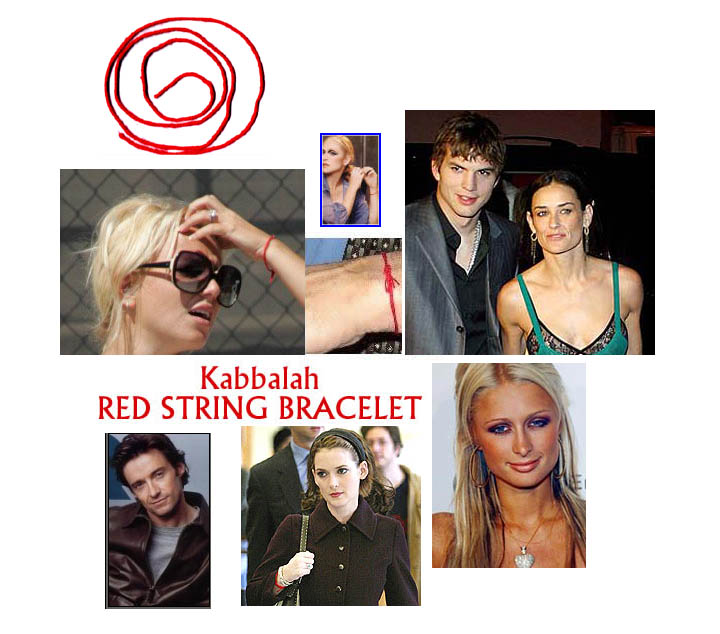Madonna, Britney, Demi, and Paris
...go Kabalistic!
Finding Their Religion...
If you seek spiritual guidance from Hollywood, then Jewish mysticism is hot. As Madonna, Britney, Demi and Paris pop up on magazine pages donning red string bracelets and talking about the wonders of Kabbalah, more people are turning to the 13th Century tradition--even as critics trash the pop-culture version as little more than the latest self-help fad. Many people are starting to wear the Cabala red string (pictured below). Paris Hilton, Madonna, Britney Spears, Charlotte (daughter of Caroline of Monaco), Demi Moore...all followers of Kabbalah. Folks, this is occult Satanism...

Yuri Rutman spent much of his 20s searching for spiritual
fulfillment--several years before Britney started talking about her
spirituality. Rutman, who grew up in the suburbs as a secular Jew, read
motivational books, practiced yoga and meditated, but nothing seemed to make
a real difference in his life until he started taking Kabbalah classes in
Chicago.
Four years later, Rutman, 31, says Kabbalah has completely changed his
outlook on life. He's less ego-driven, more positive when he meets obstacles
in his pursuit of a movie career, and he goes out of his way to help others.
"People meet me and don't recognize me," says Rutman, who describes himself
before Kabbalah as someone with a huge ego and a quick temper. "I'm the same
person--I'm just not as into myself as I used to be."
Kabbalah dates back to the 1200s, when the Zohar, a text offering
interpretations of the Torah, was published. Interest in the Jewish
mysticism has gone up and down over the centuries, and it's currently
experiencing a big upswing in attention as celebrities have started
practicing a form of it. Followers of the Kabbalah Centre, where the
celebrities study, and its satellites--including one in Chicago--say the
practice is not a religion. Though it springs from Judaism, anyone
interested in making his or her life better can benefit from Kabbalah.
"It's not about religion," said Dr. David Marder, a physician who works at
UIC and helps run Kabbalah classes and study groups in Chicago. "This is
about improving your life from a spiritual point of view."
The tools of Kabbalah, such as meditation on sacred texts, help make the
world a better place, Marder said. People learn to connect with energy,
connect with others and with the greater community, and they learn that
whatever blessings they have--money, love, energy--they should send back out
into the world to share them with others.
Marder says he's seen an increase in interest in Kabbalah over the last six
months. About 50 people are active with the Friends of the Kabbalah Centre
at 3113 N. Lincoln Ave., and more people from all kinds of backgrounds have
been coming in to check out the classes or the study group, he said.
The recent rise in Kabbalah popularity has its critics, though; some of them
say that what's being marketed now as Kabbalah is really more self-help and
New Age practices than the traditional mysticism.
Rabbi Byron Sherwin, who teaches at the Spertus Institute of Jewish Studies
and has studied Kabbalah for 35 years, says Kabbalah in the Jewish tradition
is esoteric and advanced and requires advance knowledge of the Bible,
Talmud, Jewish law and philosophy. Without those as a base, Kabbalah gets
distorted.
Sherwin is disdainful of celebrities who have gone public with their
involvement with Kabbalah. Madonna and others have actually demeaned
Kabbalah by acting as though they understand it, he said.
"A tourist is not a resident--and these people are tourists," Sherwin said.
He does understand why people are seeking out the 13th Century
discipline--they're searching for an alternative to their current lives, and
they're attracted by the fact that it's been around for so long.
"It's obvious they're looking for something and think they've found it,"
Sherwin said. "This is a very exotic alternative."
Recent followers of Kabbalah dismiss such criticisms.
Rutman, who has seen Madonna and other celebs at holiday services in Florida
and California, says Kabbalah's famous followers are just as serious as
longtime followers. He also questions why people who haven't spent years
studying religious texts and history should be left out of the joys and
balance that Kabbalah has brought to his life.
"Why can't all people be happy healthy and have balance in their life?" he
said.
What is Kabbalah?
The religion
Kabbalah is a Hebrew word meaning "tradition" or "that which is received."
It is a form of Jewish mysticism that has been practiced for at least 500
years. It is a philosophical theology based on the belief that every word,
letter, number and accent of the Torah contains keys to understanding the
nature of the universe and the human soul. Much of Kabbalah is based on the
writings of a text called the Zohar--or the Book of Splendor--a mystical,
multivolume commentary on the Torah.
The Red String
Used for centuries by the Kabbalists, The Red String connects followers to
Rachel the Matriarch, who represents the aspect of protection in the
physical realm, according to
www.kabbalah.com. Her greatest desire and purpose in life was to protect
and defend all of her children from evil. The Red String is worn on the left
wrist--the receiving side of the body and soul--sealing protective energy
within while intercepting negative influences that exist.
Online
Each month, about 30,000 people take Kabbalah Centre distance learning
courses, and about 120,000 visit the organization's Web site--
www.kabbalah.com. At centers in the
U.S. (including a satellite center in Chicago), 15,000 to 20,000 attend
prayer and meditation sessions and participate in workshops, which may mix
Kabbalah with yoga or reiki.--redeye news services.
